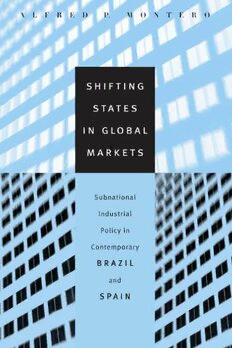
Shifting States in Global Markets: Subnational Industrial Policy in Contemporary Brazil and Spain PDF
272 Pages·2002·1.928 MB·English
Most books are stored in the elastic cloud where traffic is expensive. For this reason, we have a limit on daily download.
Preview Shifting States in Global Markets: Subnational Industrial Policy in Contemporary Brazil and Spain
Description:
Shifting States in Global Markets contributes to the debates over the political economy of globalization by focusing attention on the increasingly important role of subnational governments in implementing economic policies. Challenging the view that the effects of decentralization are positive or negative uniformly and can be explained by reference to the influence of national political institutions, Alfred Montero uses his comparisons of industrial policy in Brazil and Spain, and between different regions in these countries, to argue that we need to pay attention to political conditions at the subnational level to account for the variation in economic success between regions. Two crucial conditions are emphasized in Montero's analysis: how much competition there is among political elites within any region, and how much competition there is between regions for scarce fiscal resources. Lower competition among elites leads to subnational governments' delegating more autonomy to public agencies to develop ties with private businesses favoring allocative efficiency and innovation; higher competition between regions provides incentives for political leaders to support involvement in economic development efforts by a greater variety of public agencies, whose cooperation and mutual trust over time create the conditions for long-term success in these efforts. This analysis gives us a much more nuanced understanding of how countries are experiencing the challenges of globalization today.
See more
The list of books you might like
Most books are stored in the elastic cloud where traffic is expensive. For this reason, we have a limit on daily download.
